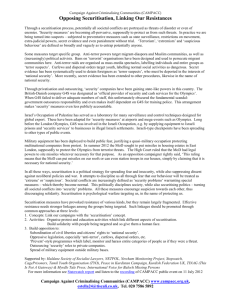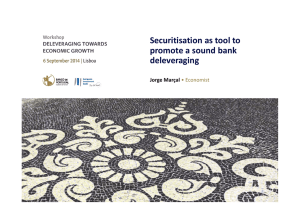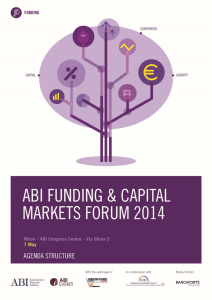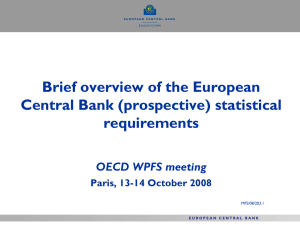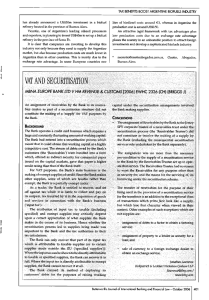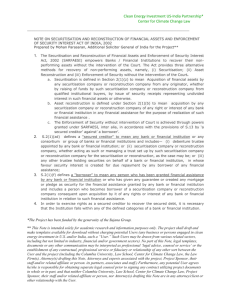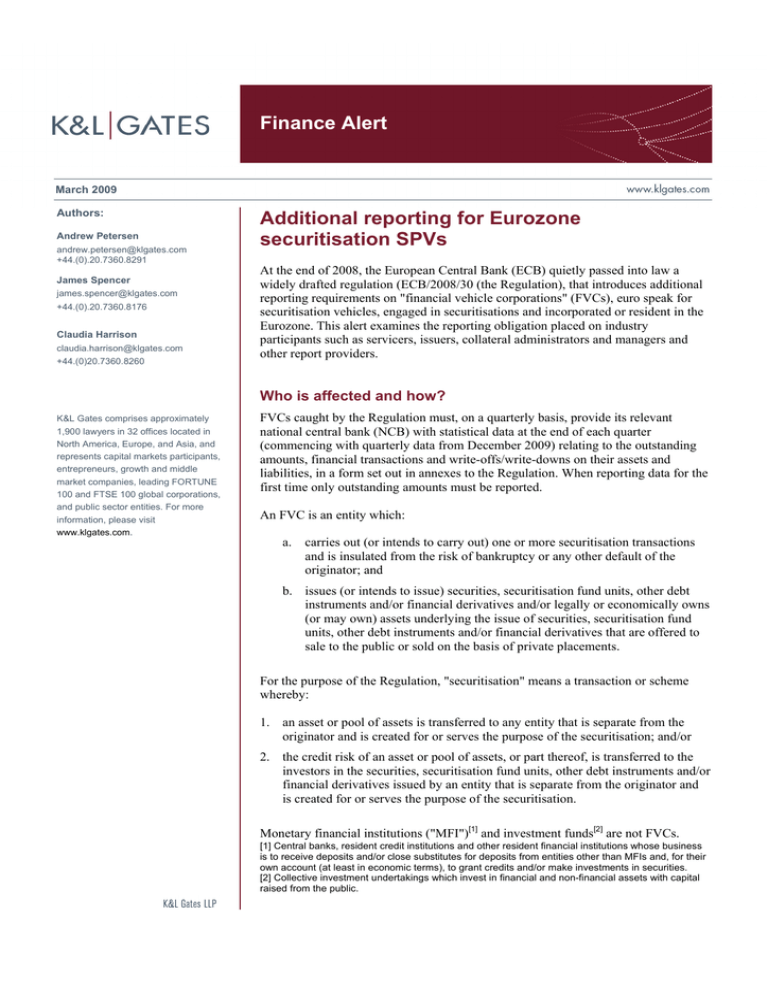
Finance Alert
March 2009
Authors:
Andrew Petersen
andrew.petersen@klgates.com
+44.(0).20.7360.8291
James Spencer
james.spencer@klgates.com
+44.(0).20.7360.8176
Claudia Harrison
claudia.harrison@klgates.com
+44.(0)20.7360.8260
Additional reporting for Eurozone
securitisation SPVs
At the end of 2008, the European Central Bank (ECB) quietly passed into law a
widely drafted regulation (ECB/2008/30 (the Regulation), that introduces additional
reporting requirements on "financial vehicle corporations" (FVCs), euro speak for
securitisation vehicles, engaged in securitisations and incorporated or resident in the
Eurozone. This alert examines the reporting obligation placed on industry
participants such as servicers, issuers, collateral administrators and managers and
other report providers.
Who is affected and how?
K&L Gates comprises approximately
1,900 lawyers in 32 offices located in
North America, Europe, and Asia, and
represents capital markets participants,
entrepreneurs, growth and middle
market companies, leading FORTUNE
100 and FTSE 100 global corporations,
and public sector entities. For more
information, please visit
www.klgates.com.
FVCs caught by the Regulation must, on a quarterly basis, provide its relevant
national central bank (NCB) with statistical data at the end of each quarter
(commencing with quarterly data from December 2009) relating to the outstanding
amounts, financial transactions and write-offs/write-downs on their assets and
liabilities, in a form set out in annexes to the Regulation. When reporting data for the
first time only outstanding amounts must be reported.
An FVC is an entity which:
a.
carries out (or intends to carry out) one or more securitisation transactions
and is insulated from the risk of bankruptcy or any other default of the
originator; and
b. issues (or intends to issue) securities, securitisation fund units, other debt
instruments and/or financial derivatives and/or legally or economically owns
(or may own) assets underlying the issue of securities, securitisation fund
units, other debt instruments and/or financial derivatives that are offered to
sale to the public or sold on the basis of private placements.
For the purpose of the Regulation, "securitisation" means a transaction or scheme
whereby:
1. an asset or pool of assets is transferred to any entity that is separate from the
originator and is created for or serves the purpose of the securitisation; and/or
2. the credit risk of an asset or pool of assets, or part thereof, is transferred to the
investors in the securities, securitisation fund units, other debt instruments and/or
financial derivatives issued by an entity that is separate from the originator and
is created for or serves the purpose of the securitisation.
Monetary financial institutions ("MFI")[1] and investment funds[2] are not FVCs.
[1] Central banks, resident credit institutions and other resident financial institutions whose business
is to receive deposits and/or close substitutes for deposits from entities other than MFIs and, for their
own account (at least in economic terms), to grant credits and/or make investments in securities.
[2] Collective investment undertakings which invest in financial and non-financial assets with capital
raised from the public.
Finance Alert
What are the timeframes?
Are there any exceptions?
Notification of existence:
An FVC which has taken up business on or prior to
24 March 2009 must inform the NCB where it is
resident of its existence by the end of March 2009,
even if it does not expect to be subject to the
reporting requirements of the Regulation.
NCBs may grant FVCs with an exception to the
requirements of the Regulation in a number of
circumstances, including where:
An FVC which takes up business after 24 March
2009 must inform the relevant NCB of its existence
within 1 week from the date on which it takes up
business, even if it does not expect to be subject to
the reporting requirement of the Regulation.
For the purposes of the Regulation, "taking up
business" means any activity, including any
preparatory measures, related to the securitisation
other than merely establishing an entity that is not
expected to commence the securitisation activity
within the following 6 months. Any activity by the
FVC taken after the securitisation activity becomes
foreseeable means taking up business.
Reporting:
The Regulation does not stipulate how long after the
end of each quarter an FVC has to submit its
quarterly data to the relevant NCB and this
timeframe will be determined locally by each NCB.
Nevertheless, each NCB is required to submit this
information to the ECB within 28 working days
following the end of the quarter to which the report
relates and so the timeframe which the NCBs will
place on an FVC will need to be considerably less to
allow each NCB time to process the data before
submission to the ECB.
The reporting burden lies with the reporting agent.
For the purpose of the Regulation, a "reporting
agent" is defined by reference to a separate EU
regulation, to view click here. There are a number of
categories which qualify as a reporting agent
including FVCs. Where the responsibility ultimately
lies will be dependent on the type of securitisation
transaction concerned and may lead to transaction
documents being amended to address the
Regulation. Potentially this could bring in additional
obligations on collateral administrators and
collateral managers in CDO transactions and
servicers in CMBS transactions.
a.
the originator of the loans is a MFI and
continues to service the securitised loans,
as that MFI is already subject to reporting
requirements in respect of these loans; and
b. the data required to be reported under the
Regulation can be derived from other
statistical, public or supervisory data
sources.
Where an SPV is considered an FVC, investigation
will need to be conducted as to whether current data
collection and accounting procedures will qualify
the FVC for an exemption.
Commentary
As part of its statistical function, the ECB's desire to
collect additional data and to be notified of losses
on a more frequent basis is understandable,
especially given the current financial climate.
Having said this, there are certain areas on which
the wording of the Regulation is ambiguous and
various industry stakeholders are currently
considering the extent to which securitisation SPVs
will be affected. Arrangers and other transaction
parties on existing securitisation transactions will
need to consider how the Regulation impacts on the
current deal documents and it may well be
necessary for existing deals to be amended to
accommodate the requirements of the Regulation.
This will cause, albeit in relatively small amounts,
existing issuers to incur unwelcome fees and
expenses in a market which is already suffering
from note downgrades, asset deterioration and
falling cashflows. The European Securitisation
Forum has formed a working group to collate an
industry response on the Regulation and a meeting
of this working group is scheduled for 8 April 2009
in Frankfurt. Industry participants are actively
encouraged to participate in shaping how this
Regulation will impact the securitisation industry
going forward.
March 2009
2
Finance Alert
K&L Gates comprises multiple affiliated partnerships: a limited liability partnership with the full name K&L Gates LLP qualified in Delaware and
maintaining offices throughout the U.S., in Berlin and Frankfurt, Germany, in Beijing (K&L Gates LLP Beijing Representative Office), in Singapore
(K&L Gates LLP Singapore Representative Office), and in Shanghai (K&L Gates LLP Shanghai Representative Office); a limited liability partnership
(also named K&L Gates LLP) incorporated in England and maintaining our London and Paris offices; a Taiwan general partnership (K&L Gates)
which practices from our Taipei office; and a Hong Kong general partnership (K&L Gates, Solicitors) which practices from our Hong Kong office.
K&L Gates maintains appropriate registrations in the jurisdictions in which its offices are located. A list of the partners in each entity is available for
inspection at any K&L Gates office.
This publication is for informational purposes and does not contain or convey legal advice. The information herein should not be used or relied upon
in regard to any particular facts or circumstances without first consulting a lawyer.
©2009 K&L Gates LLP. All Rights Reserved.
March 2009
3

